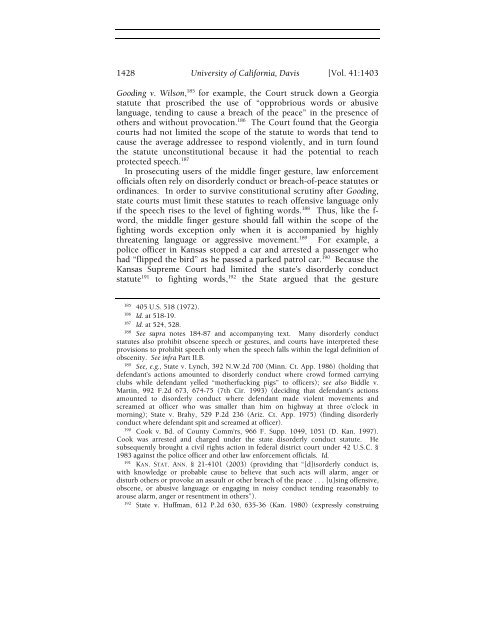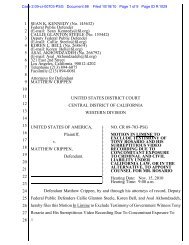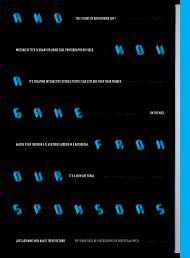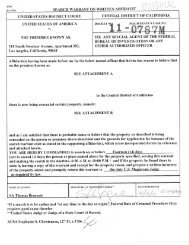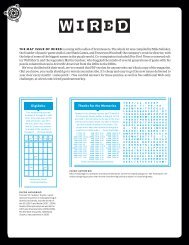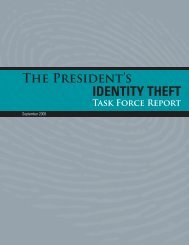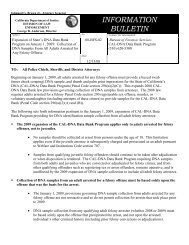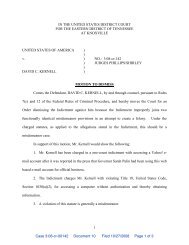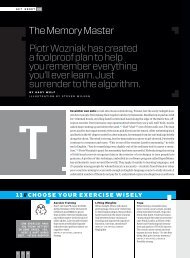Digitus Impudicus: The Middle Finger and the Law - Wired
Digitus Impudicus: The Middle Finger and the Law - Wired
Digitus Impudicus: The Middle Finger and the Law - Wired
Create successful ePaper yourself
Turn your PDF publications into a flip-book with our unique Google optimized e-Paper software.
1428 University of California, Davis [Vol. 41:1403<br />
Gooding v. Wilson, 185 for example, <strong>the</strong> Court struck down a Georgia<br />
statute that proscribed <strong>the</strong> use of “opprobrious words or abusive<br />
language, tending to cause a breach of <strong>the</strong> peace” in <strong>the</strong> presence of<br />
o<strong>the</strong>rs <strong>and</strong> without provocation. 186 <strong>The</strong> Court found that <strong>the</strong> Georgia<br />
courts had not limited <strong>the</strong> scope of <strong>the</strong> statute to words that tend to<br />
cause <strong>the</strong> average addressee to respond violently, <strong>and</strong> in turn found<br />
<strong>the</strong> statute unconstitutional because it had <strong>the</strong> potential to reach<br />
protected speech. 187<br />
In prosecuting users of <strong>the</strong> middle finger gesture, law enforcement<br />
officials often rely on disorderly conduct or breach-of-peace statutes or<br />
ordinances. In order to survive constitutional scrutiny after Gooding,<br />
state courts must limit <strong>the</strong>se statutes to reach offensive language only<br />
if <strong>the</strong> speech rises to <strong>the</strong> level of fighting words. 188 Thus, like <strong>the</strong> fword,<br />
<strong>the</strong> middle finger gesture should fall within <strong>the</strong> scope of <strong>the</strong><br />
fighting words exception only when it is accompanied by highly<br />
threatening language or aggressive movement. 189 For example, a<br />
police officer in Kansas stopped a car <strong>and</strong> arrested a passenger who<br />
had “flipped <strong>the</strong> bird” as he passed a parked patrol car. 190 Because <strong>the</strong><br />
Kansas Supreme Court had limited <strong>the</strong> state’s disorderly conduct<br />
statute 191 to fighting words, 192 <strong>the</strong> State argued that <strong>the</strong> gesture<br />
185 405 U.S. 518 (1972).<br />
186 Id. at 518-19.<br />
187 Id. at 524, 528.<br />
188 See supra notes 184-87 <strong>and</strong> accompanying text. Many disorderly conduct<br />
statutes also prohibit obscene speech or gestures, <strong>and</strong> courts have interpreted <strong>the</strong>se<br />
provisions to prohibit speech only when <strong>the</strong> speech falls within <strong>the</strong> legal definition of<br />
obscenity. See infra Part II.B.<br />
189 See, e.g., State v. Lynch, 392 N.W.2d 700 (Minn. Ct. App. 1986) (holding that<br />
defendant’s actions amounted to disorderly conduct where crowd formed carrying<br />
clubs while defendant yelled “mo<strong>the</strong>rfucking pigs” to officers); see also Biddle v.<br />
Martin, 992 F.2d 673, 674-75 (7th Cir. 1993) (deciding that defendant’s actions<br />
amounted to disorderly conduct where defendant made violent movements <strong>and</strong><br />
screamed at officer who was smaller than him on highway at three o’clock in<br />
morning); State v. Brahy, 529 P.2d 236 (Ariz. Ct. App. 1975) (finding disorderly<br />
conduct where defendant spit <strong>and</strong> screamed at officer).<br />
190 Cook v. Bd. of County Comm’rs, 966 F. Supp. 1049, 1051 (D. Kan. 1997).<br />
Cook was arrested <strong>and</strong> charged under <strong>the</strong> state disorderly conduct statute. He<br />
subsequently brought a civil rights action in federal district court under 42 U.S.C. §<br />
1983 against <strong>the</strong> police officer <strong>and</strong> o<strong>the</strong>r law enforcement officials. Id.<br />
191 KAN. STAT. ANN. § 21-4101 (2003) (providing that “[d]isorderly conduct is,<br />
with knowledge or probable cause to believe that such acts will alarm, anger or<br />
disturb o<strong>the</strong>rs or provoke an assault or o<strong>the</strong>r breach of <strong>the</strong> peace . . . [u]sing offensive,<br />
obscene, or abusive language or engaging in noisy conduct tending reasonably to<br />
arouse alarm, anger or resentment in o<strong>the</strong>rs”).<br />
192 State v. Huffman, 612 P.2d 630, 635-36 (Kan. 1980) (expressly construing


